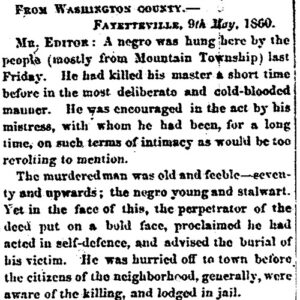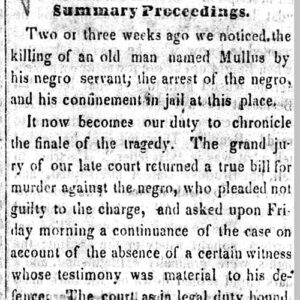calsfoundation@cals.org
Washington County Lynching of 1860
An enslaved man was lynched by a white mob in Fayetteville (Washington County) on May 4, 1860, for the murder of his owner.
Jacob Mullis was an Indiana farmer who, by 1850, was living in Washington County’s Mountain Township with his wife Emily and their two children; the 1850 census lists him as sixty-four years old and her as twenty-five and reports that he owned $1,000 worth of real estate. An 1889 account in one of the Goodspeed histories noted that “it was rumored…that he had been a well-to-do farmer in Indiana, and he had left a wife and several children, and that he had eloped with a servant girl.” By 1860, the couple had seven children, the youngest an infant.
Mullis purchased a Black man sometime in the late 1850s, and rumor held that the enslaved man and Emily Mullis (sometimes spelled Mullice) were “for a long time, on such terms of intimacy as would be too revolting to mention.”
The enslaved man, allegedly “encouraged in the act by his mistress,” killed Jacob Mullis in early May 1860 “in the most deliberate and cold-blooded manner.” A correspondent to the Arkansas Gazette stated that “the murdered man was old and feeble—seventy and upwards; the negro young and stalwart.” The Black man, who acknowledged killing Mullis but claimed it was in self-defense, was arrested and taken to Fayetteville “before the citizens of the neighborhood, generally were aware of the killing.”
He was arraigned by a grand jury on the morning of May 4, 1860, but his case was delayed because he sought witnesses “that could not possibly be procured in time for immediate trial.” The Gazette correspondent noted that “he feed [sic] his lawyers in a thousand or fifteen hundred dollars—quite a respectable sum for a darkey to handle [in] these hard times.”
That night, a crowd of people, mostly from Mountain Township, gathered at the Washington County Courthouse, where several people, including Lafayette Boone, whose father James had been killed by three of his slaves several years earlier, spoke about the case before heading to the jail, where they “demanded the prisoner.” The Gazette reported that they were “already enraged, and dreading the escape of the murderer, or disliking too long a delay of justice…took him from the jail and hung him to a limb.” A local prosecutor, writing in the Fayetteville Arkansian, stated that the sheriff “did his duty, his whole duty, but no official power could withstand the designs of the assembled multitude, and the prisoner was taken from the jail to a ‘convenient place,’ and there hung by the neck until he was dead.”
The Goodspeed account stated that Emily Mullis “was in the town at the time, and it was only through the intervention of citizens that she was saved from the same fate,” but the contemporaneous report from the Gazette correspondent only said that she “was in town grieving for his fate. She averred she had rather lose all else she possessed than the negro.” The 1860 census, compiled in Mountain Township about a month after the murder, showed her thirteen-year-old son John, Mullis’s oldest child, as being the owner of only $200 each in real and personal property, which may indicate that she spent Jacob Mullis’s “considerable amount of money” on the enslaved man’s lawyers.
The 1860 lynching was one of three in antebellum Washington County. Two men, Aaron and Anthony, were lynched on July 7, 1856, for killing their owner, James Boone. A third enslaved man, Randall, was legally executed on August 1, 1856, for Boone’s slaying.
For additional information:
“From Washington County.” Weekly Arkansas Gazette, May 19, 1860, p. 2.
History of Benton, Washington, Carroll, Madison, Crawford, Franklin, and Sebastian Counties. Chicago: Goodspeed Publishing Co., 1889.
Jones, Kelly Houston. “‘Doubtless Guilty’: Lynching and Slaves in Antebellum Arkansas.” In Bullets and Fire: Lynching and Authority in Arkansas, 1840-1950, edited by Guy Lancaster. Fayetteville: University of Arkansas Press, 2018.
“Summary Proceedings.” The Arkansian, May 11, 1860, p. 2.
Mark K. Christ
Central Arkansas Library System
 Civil Rights and Social Change
Civil Rights and Social Change Louisiana Purchase through Early Statehood, 1803 through 1860
Louisiana Purchase through Early Statehood, 1803 through 1860 Washington County Lynching Article
Washington County Lynching Article  Washington County Lynching Article
Washington County Lynching Article 




Comments
No comments on this entry yet.